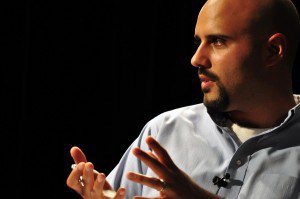Many of us have been taught that doubt is the opposite of faith, but this view assumes faith is the intellectual agreement with a set of ideas. Therefore, the opposite of faith must be to question, or doubt, those ideas. While faith certainly has an intellectual component, the Bible sees faith as more than agreement with a set of ideas. It means to put one’s confidence or trust in something. For this reason, Scripture most often presents fear, not doubt, as the opposite of faith.
The medieval theologian, Thomas Aquinas, said that fear is a contracting impulse of the soul. It causes us to turn inward to focus only on ourselves. From this posture, we cannot love, give or serve others. “It drives compassion right out of our heart,” he said. Aquinas compared a fearful person to a medieval city under siege. The resources and inhabitants from the surrounding country retreat into the city and barricade themselves behind its walls. No one else is allowed in and nothing is given out. Survival is the only objective.
When we are afraid, it is all too easy to become self-absorbed and justify our lack of generosity. We turn inward and can only think of ourselves, and from this posture compassion and love toward others becomes impossible. Fear prevents us from seeing beyond our own needs.
Putting our faith in Jesus, however, ends the siege and breaks down the wall. Faith means trusting that God loves me and will let no ultimate harm come to me. His love for us, and His power to redeem us, was proven when He sent His own Son to die in order to reconcile us to Himself. As Paul says in Romans 8:31-32, “If God is for us, who can be against us? He who did not spare His own Son but gave Him up for us all, how will He not also with Him graciously give us all things?”
In the same chapter, Paul goes on to express our perfect safety in God’s hands: “I am sure that neither death nor life, nor angels nor rulers, nor things present nor things to come, nor powers, nor height nor depth, nor anything else in all creation, will be able to separate us from the love of God in Christ Jesus our Lord” (Romans 8:38-39).
When we come to recognize and trust God’s incomprehensible love for us, we discover the courage to abandon our fears. It gives us the courage to break down the walls of selfishness and open our hearts to others. This trust is what empowered Peter to step out of the boat and walk with Jesus on the sea. This trust is what empowered Paul to face imprisonment, beatings and persecution without despair. And this trust is what opens our hearts to give ourselves generously to others.
Reflect: How do you think nonbelievers view Christians? Do they view us as loving, generous, self-sacrificial people like Jesus? If not, what role do you think fear has in the posture Christians take toward those outside the faith?
(Excerpt from Whole-Life Generosity Devotional, used with permission from GenerousChurch).


 Skye Jethani
Skye Jethani
